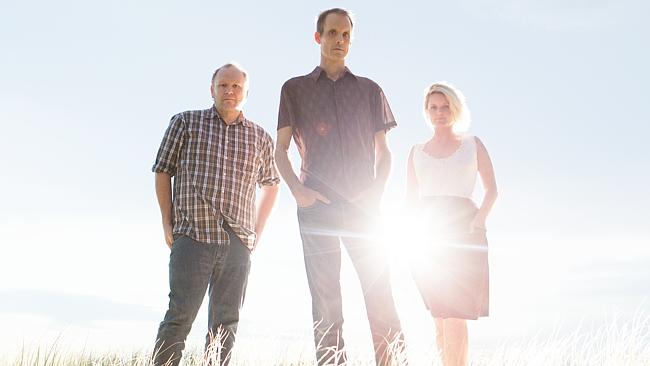Why play solo when We All Want To

Tim Steward and co are waiting for the sun on new album The Haze.
Source: Supplied
THIS week’s album reviews from The Courier-Mail (ratings out of five stars):
ROCK
We All Want To, The Haze
(Independent) ****
Put a guitar in Tim Steward’s hands — which seems to be most of the time — and he is always going to want to rock. That’s been part of his band Screamfeeder these past 20 years.
We All Want To started life as a solo project but it grew into a band, and with the release of The Haze, it’s a band that’s now three albums into its career.
Like Screamfeeder, WAWT rock, but perhaps in a more careful way, with extra focus on the pop melodies.
On The Haze, they crank things up to new levels of intensity, as heard in the opening notes of Eileen Afternoon. Steward’s guitar snarls and bites, a statement of intent if ever you heard one.
The pop melodies are still front and centre — song after song of them; swooning delights like Everybody’s Damaged and the full-tilt Party Girls (“Hanging around with bands is going to spell trouble … You spend your 20s making a noise and trying to stay upright.’’)
WAWT have always made music for dancing and singing along, but even more so here with crunchy pop-rockers such as Young Love and Road to Ruin, which will be dynamite on the live stage.
And just when you’re smiling along with the dreamy, summery feel of The Deep End, the guitars lift off to a new level of urgency.
The Haze is right for the title, too, since most of the album seems bathed in a golden glow as it looks back fondly; innocent days, teenage love, lost friends and beach scenes are etched deep in its DNA.
Most of us have to grow up and move on — even the party boys and girls, a theme that’s explored further in the sublime Wish You Didn’t Go Straight, where Steward delivers one of his most heartfelt lyrics in a career that’s already littered with gems: “I heard you sold your skateboard, and I heard you got some new friends … I wish you didn’t get frightened and have to choose.”
With the music matching the force of the emotions, the result is a power-pop classic.
Like Buildings Collapsing brings in brass as Steward and Skye Staniford lock voices.
Staniford steps up to take the lead on the extraordinary Remove the Arrow, a break-up song that starts out gentle and vulnerable before exploding into a chorus that will have you punching the air in delight.
WAWT have always found a way to regroup around the core of founders Steward, Staniford and drummer Dan McNaulty. Since this recording, they have brought in two new members for live work.
With songs like this to play, the newbies are in for an exhilarating ride.
Noel Mengel
CLASSICAL
Nemanja Radulovic, Songs My Mother Taught Me
(Deutsche Grammophon) ****1/2
Music academics can go ballistic when a performer takes liberties with black dots and dashes on white paper, as they once did at a Brisbane meet convened to consider, in all seriousness, why pianist David Helfgott should not perform in public. What would they say about Serbian violinist Nemanja Radulovic, wildly furious and hauntingly quiet in turn? In Brahms’ Hungarian Dance No 1 in G Minor, Khachaturian’s Sabre Dance and other vigorous classics, Radulovic does what he wills. Wizard bow strokes and fingers flying across strings send music soaring as a spirit set free. A ballet dancer could not keep pace with his Russian Dance, from Tchaikovsky’s Swan Lake, but Radulovic dances through it. With Berlin Symphony Orchestra as an empathetic backdrop, he weaves depths of emotion into a heartfelt hush in John Williams’ Schindler’s List Theme and Dvorak’s haunting Songs my Mother Taught Me. In company with vocalist Ksenija Milosevic and guitarist Aleksandar Sedlar for Set, Set, Bright Sun, Radulovic builds a powerful finale.
Patricia Kelly
FOLK
Laura Marling, Short Movie
(Ribbon) ****
Wearing a short, spiky haircut and playing electric guitar, British new-folk darling Laura Marling has had a rebranding of sorts for her fifth album. There’s less Joni Mitchell and more stripped back art-rock (Pretenders, Velvet Underground) as the famously prickly singer, now 25, continues her search for identity amid the pressures of sudden fame and failed relationships. It’s a solitary and difficult journey and the dream-like opener The Warrior presents the singer as a warhorse who can no longer carry an inadequate soldier/lover. That said, Short Movie is more buoyant and accessible than her masterfully claustrophobic break-up opus Once I Was an Eagle (2013). The punkish False Hope is a straightforward account of Marling’s insomnia and panic in blacked-out New York. There is plenty of bleak humour amid the talking blues of Strange as Marling skewers a married would-be suitor. “Do your best to be a good man,’’ she scolds. The wider soundscape extends to the breezy Dire Straits-like Gurdjieff’s Daughter and the country noir of Howl
. Formidable stuff.
David Costello
HOME VIDEO
Foo Fighters, Sonic Highways
(RCA) ****
Lest you dismiss this as just another Dave Grohl vanity project, “do yourself a favour” and check it out. Rather than a self-indulgent making-of, it’s a fascinating documentary series on eight great cities of US music, the creative forces that shaped them and the legacy they left. It doesn’t simply interview some of the still-living legends, but the independent labels, studio owners and producers who were co-conspirators in making musical history. Particularly poignant is Grohl’s return to Seattle where it all started for him, charting the rise of Nirvana at the vanguard of grunge, and the Lennon-level tragedy of Kurt Cobain’s death. The Rattle and Hum-like musical journey also takes in New York, Washington, Los Angeles, Chicago, New Orleans, Nashville and Austin. Each episode ends with the band performing the song that was conceived in that city, and the lyrics have much more meaning in the context of the episode than they do listening to the album in isolation. If Grohl is the self-appointed curator of American musical history, then it appears to be in safe hands.
John O’Brien
Before Before Album by Infinity Broke
ROCK
Infinity Broke, Before Before
(MGM) ****
Scarifying guitars and songs that ran dark and deep were always Bluebottle Kiss’s trademark. After a spell of more acoustic-based solo releases, Jamie Hutchings cranks up the Jazzmaster once more with explosive results on this second album from his new band. This music is welcome at a time when so few bands come through with this balance of blasting guitars and pop thrills. Before Before could even be stronger than the first album, more song-based and concise, but still seething with emotion. It ranges from the surf guitars (think Link Wray meets Midnight Oil on Wedding Cake Island) of Only the Desert Grows to the slow-burning fires of Cinder Borne. The avant-noise tendencies are still present on Domestik, where listeners seem to find themselves inside a grandfather clock falling down a set of stairs. But the tunes are solid too, sitting atop angular riffs and thundering drums is Famine of Words while guitars slash like knives on Raining People. These are songs as fierce as anything in the BBK catalogue and just as worthy of your attention.
Noel Mengel
ROCK
Mumford & Sons, Wilder Mind
(Dew Process) **
In with the rock drums and electric guitars; out with the acoustic flavours. But you won’t find many other changes on the London folk-rockers’ third album, which tends to make them sound like a lot of other bands. Opener Tompkins Square Park might even be mistaken for Coldplay. Believe sits amid glistening string synths, while The Wolf is delivered like one of those pounding Arcade Fire festival specials. But all the layers tend to diminish the intended effect. Monster, for example, sounds naggingly like some Mumford & Sons song you’ve heard before, minus the banjo. Any band that lasts has to undertake some reinvention (unless they’re AC/DC), as much for the sanity of the members as anything else. The usual methods: the soul record, the psych record, the gospel song, the brass and backing singers, the Eastern modes, those fancy chords from the Beatles songbook. Not here though. Millions will possibly approve, although whether they will back up again for album No. 4 remains to be seen.
Noel Mengel
ROOTS
The Black Sorrows, Endless Sleep
(Head) ****
Joe Camilleri has always paid respect to the greats, notably in his Bakelite Radio recording project. Here he does it as The Black Sorrows, with a vinyl-only release originally produced for Record Store Day, across two albums (subtitled Chapter 46 and 47). It’s where Lou Reed’s Dirty Boulevard comes out sounding like something from a Warren Zevon album and he can tip the hat to seminal talents such as Ray Charles. His taste in blues leads to songs from Blind Willie McTell (God Don’t Like It) and Big Maybelle (That’s a Pretty Good Love, with devastating vocal from Vika Bull) and he can stretch out with his sax on John Coltrane’s Lonnie’s Lament. Outsiders appeal to Camilleri: Doug Sahm’s country-soul blues; Captain Beefheart (Too Much Time from Clear Spot), Willy DeVille, Bobby Charles, Gil Scott-Heron. The Black Sorrows find new spirit in songs like Hank Williams’ I’m So Lonesome I Could Cry, delivered as a late-night R & B groove, and Skip James’ Hard Time Killing Floor, rendered as a stone-funk workout. Tasty.
Noel Mengel









